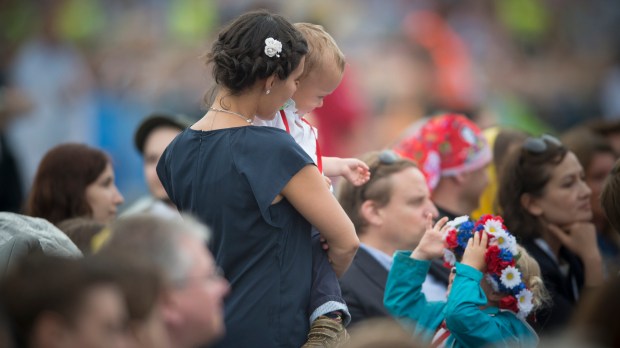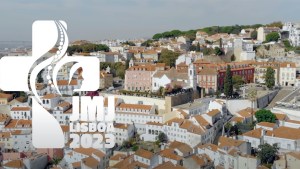The Vatican’s Dicastery for Laity, Family, and Life is aiming to increase attention on local World Youth Days – events that are intended to be held every year in local Churches, in the lead-up to the international World Youth Days held every three years with the pope.
On May 18, the Dicastery presented some new guidelines.
WYD History
WYD was the result of “great prophetic insight” from Pope St. John Paul II. The Polish Saint wanted all young people to feel that they are cared for by the Church.
Pope Benedict XVI continued along the same lines and on various occasions stressed that these events are “a providential gift for the Church … a remedy against faith fatigue,” “a new, more youthful form of Christianity” and “new evangelization put into practice.”
In a similar manner, Pope Francis at the end of the WYD in Rio de Janeiro in 2013, said that the event was “was a new stage on the pilgrimage of youth crossing the continents bearing the Cross of Christ.”
In local Churches
The document highlights that as not all youth can attend the International celebrations, the local events serve “to raise awareness among the ecclesial community as a whole − laity, priests, consecrated persons, families, adults and the elderly – of their mission to transmit the faith to the younger generations.”
On November 22, 2020, the Solemnity of Christ the King, Pope Francis called for a relaunch of the celebration of WYD in the particular Churches. The pope announced that the celebration, formerly held on Palm Sunday, will now be held on the Sunday of the Solemnity of Christ the King, starting from 2021.
Tracing a link between these two liturgical celebrations, the document notes that on Palm Sunday, the entry of Jesus into Jerusalem is that of a “king, gentle and riding on a donkey” (Mt21:5) and acclaimed as Messiah by the crowd.
In this light, the key proclamation that must be addressed to young people, and must be at the center of every diocesan WYD celebrated on the Solemnity of Christ the King is to “receive Christ! Welcome him as King into your lives! He is a King who came to save!”
The Dicastery thus invites dioceses and eparchies to celebrate the WYD on the Solemnity of Christ the King, placing young people at the center of pastoral attention, praying for them, engaging them as protagonists to promote communications campaigns, among other things.
Dioceses are also to consider the celebrations as part of a “broader pastoral journey of which WYD is only one stage” in line with Pope Francis’ recommendation that “youth ministry has to be synodal; it should involve journeying together.”
Each year, the pope publishes a message for the local celebrations.
WYD – festival of faith
The Pastoral guidelines also explored six cornerstones that are to be at the heart of the WYD.
“WYD offers young people a lively and joyful experience of faith and communion, a space to experience the beauty of the face of God.”
Since at the heart of a life of faith is our encounter with Jesus, every WYD should “resound with the invitation for each young person to meet Christ and enter into a personal dialogue with him,” the guidelines note.
In this regard, the programme of the international WYD can inspire the local celebration where it can be creatively adapted to include particular attention to “moments of silent adoration of the Eucharist as an act of faith par excellence, and to penitential liturgies as a special place of encounter with God’s mercy.”
Other key elements are:
- Experience of Church: that young people “grow in their awareness of being an integral part of the Church.”
- Missionary experience: missions can be organized which encourage young people to visit people in their homes carrying “a message of hope, a word of comfort or simply being willing to listen.”
- Vocational discernment and call to holiness
- Experience of pilgrimage: WYD is a great opportunity for younger generations “to explore local shrines and other significant places of popular piety”
- Universal fraternity: “The diocesan/eparchial event can be a very good opportunity to motivate and welcome all those young people who may be looking for their place in the Church and who have not yet found it.”



